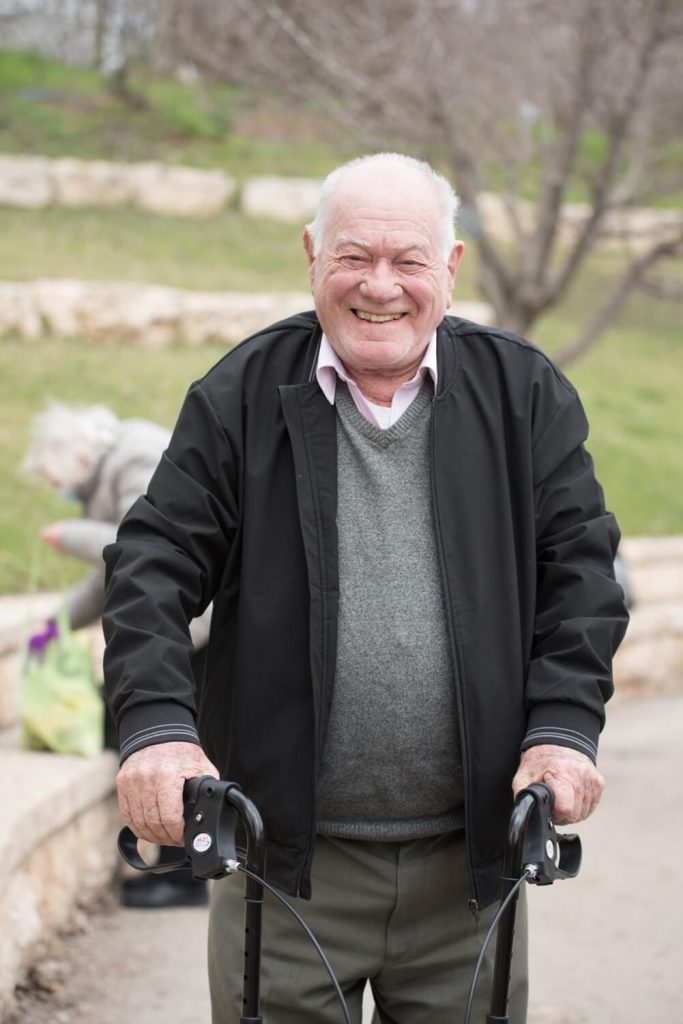
"בכל מקום ובכל עת השתדל להיות אדם (מנטש)".
"אבי, מרדכי ירושלמי, נולד בהונגריה. לא הייתה לו ילדות כמו לכל הילדים. כשהיה בן שש אביו נשלח לעבודות כפייה, והוא נשאר עם אימו, סבתו ואחותו, שרק נולדה. יום אחד נתפסה אימו ברחוב בזמן שנאסר על היהודים להסתובב ברחובות. זו הייתה הפעם האחרונה שאבי ראה את אימו. לימים נודע לו שאימו צורפה לאחת מצעדות המוות הידועות. כעבור כמה זמן כונסו כל היהודים בגטו. אבי שנשאר עם סבתא, שלא תפקדה בשל הטראומה שחוותה, ואחות קטנה בת שנה, הבין שהוא חייב להיות 'הגבר בבית' ולדאוג להן.
הם גרו בבית האחרון שבגטו. הבית שלידם ספג פצצה ונפער בו חור, שממנו יצא אבי כמעט כל ערב לרחוב האסור כדי לגנוב אוכל. יום אחד הוא כמעט שנתפס. הנאצים ירו לעברו, אך הכדור רק שפשף את ראשו ופצע אותו. הפגיעה לא הייתה רצינית, והשלל שהשיג היה עצום – קילו סוכר, תפוחי אדמה וקילו שוקולד לבישול. הוא חילק את השלל הזה למנות קטנות וסחר בו בגטו.
לאחר שהרוסים שחררו את הגטו, אבי, אחותו וסבתו התאחדו עם המשפחה ששרדה. לימים, הצליח אביו פנחס הצליח לחזור להונגריה, ובדרך נס נפגש עם אבא במפגש מרגש. אביו התחתן בשנית, ואבא זכה גם באם חדשה וגם באח חדש, שמואל, ובהמשך נולדו גם רובי וחיה. המשפחה עלתה לארץ בשנת 1951 באונייה 'ארצה' והגיעה לירושלים, לשכונת אבו טור ובקעה. היום הוא נשוי לרחל."
Mordechai Yerushalmi – born in 1936 in Budapest in Hungary
“Always and everywhere, strive to be a decent human being (a mensch).”
“My father Mordechai Yerushalmi was born in Hungary. He did not have a normal childhood. When he was six, his father was sent to a forced labor camp, and he remained with his mother, his grandmother and his new-born sister. One day his mother was seized in the street when Jews were forbidden to be in the streets. That was the last time my father saw his mother. Eventually he learned that his mother was sent on one of the infamous death marches. Some time later all the Jews were moved into the ghetto. My father stayed with my grandmother, who could not function because of the trauma she had experienced, and his little sister aged one year. He understood that he had to be the “man of the house” and take care of them.
They lived in the last house in the ghetto. The house next to them was bombed, creating a hole from which my father crept out into the street nearly every evening to steal food. One day he was almost caught. The Nazis fired at him but the bullet only grazed his head. The wound was not serious, and his loot was tremendous – a kilo of sugar, potatoes, and a kilo of cooking chocolate. He divided the loot into small portions which he traded in the ghetto.
After the Russians liberated the ghetto, my father, his sister and grandmother were reunited with the family that had survived. Eventually his father Pinchas managed to return to Hungary, and miraculously met with my father at a very emotional meeting. His father remarried, and my father gained a new mother and also a new brother, Shmuel, and later Ruby and Haya were born. The family immigrated to Israel in 1951 on the ship Artza and settled in Jerusalem, in the Abu Tor and Beka’a neighborhoods. Today he is married to Rachel.”